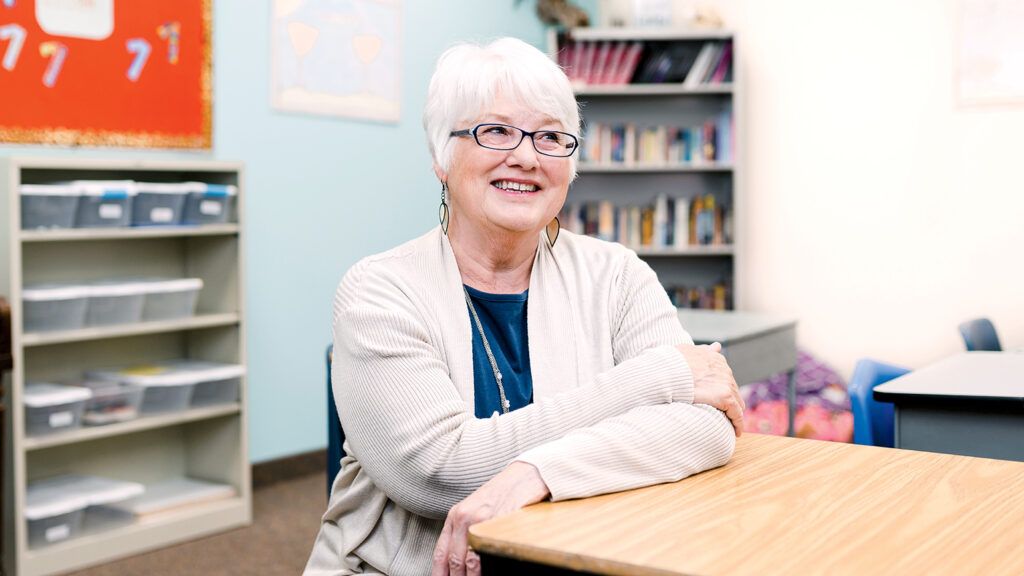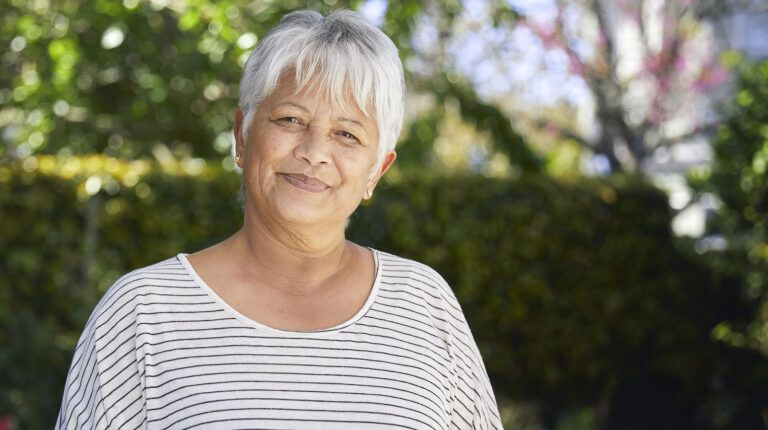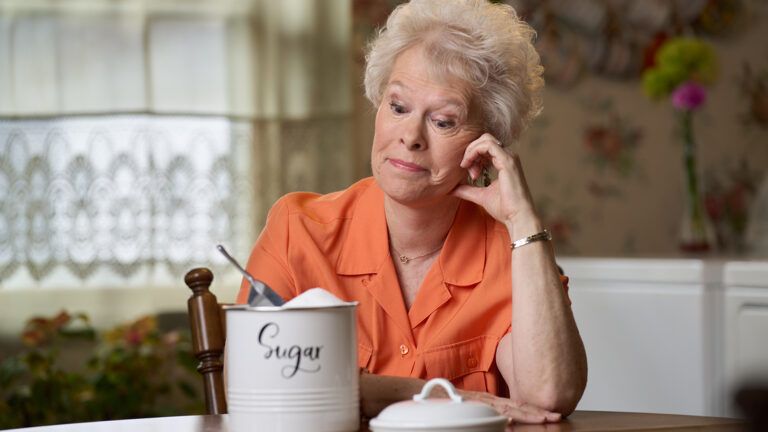I thought retirement would be a sort of nonstop holiday. But here I was, Friday night, dozing through a rerun of M*A*S*H* with my husband, Joe, the end of another uneventful day. An hour until bedtime. Sleep was usually the thing I looked forward to most.
My phone pinged, jolting me awake. A text from the principal of Trinity Lutheran School: “Good news! Jim’s getting his liver transplant!”
“Awesome!” I typed back. I’d done some occasional subbing for Jim Chatel’s seventh-eighth-grade class that past fall and winter, when complications from a rare liver disease sidelined him. Ever since, I’d kept him and his young family in my prayers.
The principal asked, “Could you take over his class till the end of the year?” Wait. What? It was late March. There were two solid months of classes left! Maybe I wasn’t thrilled with retirement, but no way was I going back to work full-time. Even temporarily.
Before I could tell him I wasn’t interested, he’d already sent me an e-mail outlining the job. I studied the color-coded schedule. Two other teachers would handle math and social studies. I’d teach everything else: language arts, reading literature, science and vocabulary. He added, “If you could squeeze in a couple of art lessons each week that would be great too.”
I reminded him I knew nothing about teaching junior high. I’d taught English composition at a university. That seemed a lifetime ago, before my husband was in a bike accident and suffered a traumatic brain injury, forcing me to retire to care for him. Joe was fully recovered now, but still, I was used to teaching college students, not middle schoolers. Science? Art? I wouldn’t even know where to begin. The principal needed an answer by Monday. I told him I’d think about it. I knew he was in a bind if I was his choice. God, there must be someone else.
I didn’t used to be so negative. There was a time I would have jumped at something new to do. That’s what I’d thought I would find in retirement. But a lot of my energy had been consumed by caregiving. Then in January, I turned 65. My hip ached. Winter felt as if it would never end. The schools here had already had 20 snow days. Almost every day, I needed a nap. I barely left the house, except for going to church, the grocery and picking up the grands after school occasionally. I felt ancient. As if life had passed me by.
I spent the weekend telling myself all the reasons I couldn’t teach. But Monday morning I woke with nothing to do. Nothing to look forward to. It had never been like that when I was teaching. I remembered the excitement of connecting with my students, seeing the difference I was making. I already knew the seventh and eighth graders from my times subbing. They weren’t awful. It couldn’t be worse than sitting around the house all day.
I texted the principal: “Okay. Here’s hoping I don’t completely derail their education.” He responded with a laughing-out-loud emoji. I didn’t have the heart to tell him I wasn’t joking.
My first day would be Monday, April 15, the day of Jim’s surgery. The night before, my stomach was in knots. “Don’t worry,” Joe said. “You know what you’re doing.” But did I? I hadn’t as much as made up a lesson plan in seven years. I stayed up late reading and rereading the textbooks.
I woke early the next morning to a ping from my phone. “No school due to the snow.” A reprieve. That evening came news that Jim’s surgery had been a success. I reminded myself that’s really why I was doing this.
The next day the kids greeted me warmly. I passed out fresh baked brownies, just as I had when I’d subbed for them, and told them a bit about myself, how I’d taught college-level English for eight years. Things went downhill in the days that followed. There were constant disruptions. The school was preparing for its annual operetta, and the seventh and eighth grade students all had major roles. I couldn’t find my rhythm. The students were distracted. Then we got slammed by another ice storm. Three more snow days. Another week of school was added to the schedule. The students hadn’t even cracked their science textbooks.
“I’m cutting the first half-hour of silent reading time,” I announced to the class our first day back. “Also, afternoon recess. We have to get focused and make up for lost time.”
The class looked stunned, then complaints started flying. “I can also shorten lunch period,” I said. The room went silent. The kids glared at me. “I wish Mr. Chatel was back,” I heard one boy, Nik, mutter.
I ignored it, though nearly every day with Nik, the class clown, had been difficult. “Let’s talk about how to do proper sourcing for your research papers,” I said. There were groans, but I plunged ahead, detailing how to effectively use direct quotes. After lunch, we finally got to science, the lecture I’d prepared weeks earlier on cnidarians and coral reefs. I could see their eyes glazing over, but what could I do? It was part of the curriculum. We ended the class reading from their vocab books and doing the exercises together. When the bell rang, they handed in their work and headed out, shoulders slumped.
The kids hated me. I went to the school chapel to try to collect my thoughts. I should have never accepted this assignment. I wasn’t the right fit. But it was too late to quit now. Lecturing wasn’t going cut it. I had to find some way to engage them. That evening, i baked brownies again. I put one on each student’s desk in the morning, hoping for a fresh start. “I’m reinstating silent reading time,” I said. “Then I’d like you to select a book we can read together for Literature.” They munched on their brownies, smiles all around. Then they dug through books in the Lit boxes.
They picked Bud, Not Buddy to read as a class, a book I’d secretly hoped they would choose, about an African-American boy growing up in Flint, Michigan, during the Great Depression. We took turns reading the first chapter. The kids read loudly, confidently. We all laughed at how Bud got back at a mean boy at his orphanage. Then I had them write about what we had read, including direct quotes the way I’d taught them. I’d never seen them so focused, the room silent except for the sound of their pencils scratching in their journals.
The next day, for science, I brought in a whole uncooked chicken. At first, the students watched as I cut through the layers, exposing the muscles, then opened up the chest cavity and showed them where the heart would be, cut open the sack of giblets and showed them the actual heart and liver, the gizzard. The children were fascinated. “Can we do it?” Nik asked.
The very reaction I’d hoped for!
“Yes,” I said, “if you’re very careful.” I handed them blue surgical gloves I’d bought and let them take turns. One boy, Kaiden, focused on the tendons near the leg joint, talking about them as knowledgeably as if he were a doctor.
“Where did you learn that?” I asked.
“I hurt my knee playing football,” he said. “I know a lot about foot tendons too, but this chicken’s missing his feet.” Everyone laughed.
It had been a great lesson, but there were still frustrations. A handful of students were flunking because they’d simply not turned in assignments. Every day, it seemed, they came back later and later from lunch. They forgot to charge the Chromebook computers the school provided them, so when it was time to use them the batteries were drained. It was as if they just didn’t care.
There were three weeks of school left, but with all the end-of-year activities only six real days remained for the students to prepare for their final science exam. I’d already decided to make it open book, but it would still be challenging. There were so many concepts they just didn’t seem to grasp.
One day at recess I sat on a hill, watching the children play what looked like a complicated game. “Come play with us,” a girl named Anna yelled.
“I don’t know the rules,” I yelled back with a shrug.
“We’ll teach you,” Anna said.
Let the kids teach. Could that actually work? I thought of Kaiden, how expertly he’d discussed chicken tendons. I’d already gone over every science lesson in detail with them. Maybe I didn’t need to talk more. Maybe what they needed most was my encouragement. I jumped to my feet and jogged down the hill to join them. Funny how my hip wasn’t aching so much anymore.
The next day, I ran my idea past the class. They looked at me quizzically. “Seriously?” one student said. For a moment I questioned myself. After all, their grades were riding on this.
“Yes,” I said with all the conviction I could muster. “You know the information as well as I do. You just need to believe in yourselves.”
The first few lessons went well. Then it was Nik’s turn. I doubted he’d ever heard a word I’d said for all his jokes and interruptions.
“Are you ready?” I asked. Nik waggled his eyebrows, sending the class into giggle mode. I gave him my book and the answer guide. He strolled to the podium and wrote “Mr. Nik” on the whiteboard.
“Open your books to section 4.1 and get out your study guides,” he said, in a mock professorial voice. “But first, who has seen Finding Nemo?”
The class howled. I opened my mouth to shut him down, then noticed he wasn’t laughing.
“I’m serious,” Nik said. “There’s a scene in there about Dory and Nemo and the cnidarians. If you have trouble remembering them, just think of that scene. It’s everything you need to know. Okay, Ryan, please read the first paragraph.”
I couldn’t believe it. Nik was a natural. The class hung on his every word. He’d gone 10 minutes over before I realized I’d forgotten to set the timer.
At recess I told him how impressed I’d been. “Have you ever thought about becoming a teacher?” I asked.
“Not until today,” he said shyly. “But I wouldn’t want to teach kids like me. I’d teach college.”
I laughed, marveling at his words, at everything that had happened these past two months. The sense of accomplishment at seeing a student grasp a concept. The connection with my class. The joy of doing meaningful work. I felt it all, stronger than ever. Retirement would have to wait. God, I knew, had other plans for me.
“Thanks, Mr. Nik,” I said. “I’ll be happy if I can learn to teach middle school like you do.”
Read More: For Retirees, It’s Never Too Late to Serve
For more inspiring stories, subscribe to Guideposts magazine.






